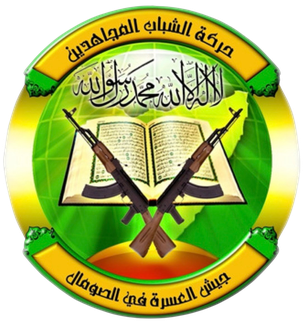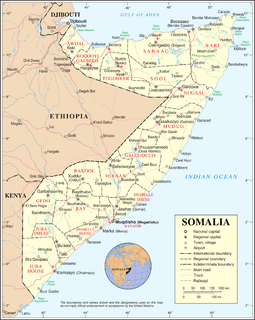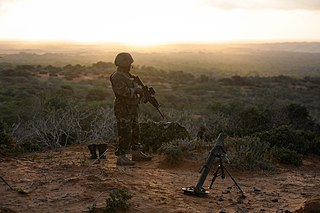This article needs to be updated.(January 2020) |
This article contains a timeline of events for the Somali jihadist group Al-Shabaab.
This article needs to be updated.(January 2020) |
This article contains a timeline of events for the Somali jihadist group Al-Shabaab.
| Wikinews has related news: |
| | This section needs expansion. You can help by adding to it. (June 2021) |
| | This section needs expansion. You can help by adding to it. (June 2021) |
| | This section is empty. You can help by adding to it. (June 2018) |
| | This section needs expansion. You can help by adding to it. (June 2021) |
| | This section needs expansion. You can help by adding to it. (June 2021) |
December 10: United States Africa Command (AFRICOM) killed multiple al-Shabaab explosives experts in two airstrikes on a compound near Jilib, Somalia. [213]
December 24: Somali security forces killed seven al-Shabaab militants in an operation in Garbaharey in the southern region of Gedo. [214]
| | This section needs expansion. You can help by adding to it. (June 2021) |
January 31: 80 year old General Mohamed Nur Galal, who ousted Siad Barre in 1991 - was killed in an attack on Hotel Afrik in Mogadishu. At least five civilians and four gunmen were killed and ten people were injured in the attack. Al-Shabaab said that Galal was their main target. [215]
February 7: Al-Shabaab claimed responsibility for a roadside bomb which killed twelve people from the National Intelligence and Security Agency (NISA), in the Hodan district of Mogadishu, where political leaders had met to try to resolve a deadlock over the presidential elections which were due to be held on 8 February. Fatalities included Abdirashid Abdunur, the head of NISA in Dhusamareb. [216]
March 5: 2021 Mogadishu suicide car bombing
June 15: June 2021 Mogadishu bombing
December 13: The terrorist group Al Shabaab has taken over the town of Mataban, in central Somalia, after the withdrawal of government forces without providing combat, after the seizure of two other villages in the area in the previous hours. Al Shabaab has indicated that it has broken into Mataban after taking over Bada and Bergadid, in the Hiiraan region. Residents of the city cited have confirmed the entry of Al Shabaab into the city and added that the militiamen have raised their flag at the administrative offices and at the Police headquarters to confirm their control of the town. [217]

The Somali Civil War is an ongoing civil war which is taking place in Somalia. It grew out of resistance to the military junta which was led by Siad Barre during the 1980s. From 1988 to 1990, the Somali Armed Forces began engaging in combat against various armed rebel groups, including the Somali Salvation Democratic Front in the northeast, the Somali National Movement in the northwest, and the United Somali Congress in the south. The clan-based armed opposition groups overthrew the Barre government in 1991.

The Somalia War, also known as the Ethiopian occupation of Somalia or Ethiopian intervention in Somali Civil War was an armed conflict involving largely Ethiopian and Somali Transitional Federal Government (TFG) forces and Somali troops from Puntland versus the Somali Islamist umbrella group, the Islamic Court Union (ICU), and other affiliated militias for control of Somalia.

The African Union Mission in Somalia (AMISOM) is an active, regional peacekeeping mission operated by the African Union with the approval of the United Nations Security Council. It is mandated to support transitional governmental structures, implement a national security plan, train the Somali security forces, and to assist in creating a secure environment for the delivery of humanitarian aid. As part of its duties, AMISOM also supports the Federal Government of Somalia's forces in their battle against Al-Shabaab militants.

Harakat al-Shabaab al-Mujahideen, more commonly known as al-Shabaab, is a Somalia-based terrorist jihadist fundamentalist group active in East Africa and Yemen. The group describes itself as waging jihad against "enemies of Islam" and is engaged in combat against the Federal Government of Somalia and the African Union Mission to Somalia (AMISOM). The group has been suspected of having links with al-Qaeda in Islamic Maghreb and Boko Haram. Due to its Wahhabi roots, al-Shabaab is hostile to Sufi traditions and has often clashed with the Somali Sufi militia Ahlu Sunna Waljama'a. Al-Shabaab’s leaders and commanders are mainly from the Hawiye clan, which is one of the largest clans in Somalia. It has attracted some members from Western countries, including Briton Samantha Lewthwaite and American Abu Mansoor Al-Amriki.

The 2009–present phase of the Somali Civil War is concentrated in southern and central Somalia and portions of north eastern Kenya. It began in early February 2009 with the conflict between the forces of the Federal Government of Somalia, assisted by African Union peacekeeping troops, and various militant groups and factions. The violence has displaced thousands of people in the southern part of the country. The civil war has also seen fighting between the Sufi Ahlu Sunna Waljama'a and al-Shabaab.

Hizbul Islam, also known as Hizbul Islaami, Hisbi Islam, or Hezb-ul Islam, was a Somali Islamist group formed after four Islamist groups merged to oppose the new Somali government of President Sheikh Sharif Ahmed. The four groups were: Hassan Aweys' the ARS-A, Jabhatul Islamiya, Hassan Abdullah Hersi al-Turki's the Mu'askar Ras Kamboni and Muaskar Anole, the Marehan clan's Militia and Harti clan's militia. These groups previously took part in the fighting against the Ethiopian occupation of Somalia.

The Battle of Mogadishu (2009) started in May with an Islamist offensive, when rebels from al-Shabaab and Hizbul Islam attacked and captured government bases in the capital of Mogadishu. The fighting soon spread, causing hundreds of casualties, and continued on at various levels of intensity until October. The battle's name usually includes the year, when referenced, in order to distinguish it amongst the nine major Battles of Mogadishu during the decades long Somali Civil War.

The Battle of Mogadishu (2010–11) began on 23 August 2010 when al-Shabaab insurgents began attacking government and African Union Mission to Somalia (AMISOM) positions in the Somali capital of Mogadishu. Al-Shabaab began its offensive after its spokesman said the group was declaring a "massive war" on troops sent by AMISOM, describing its 6,000 peacekeepers as "invaders". In December 2010 the number of AMISOM troops was increased to 8,000 and later to 9,000. The battle's name usually includes the years, when referenced, in order to distinguish it amongst the nine major Battles of Mogadishu during the decades long Somali Civil War.

This is a 2011 timeline of events in the Somali Civil War (2009–present).

The Raskamboni Movement was a jihadist Islamic movement led by Sheikh Ahmed Madobe, the current president of the Jubaland state in southern Somalia. After fighting with Al-Shabaab they managed to capture Kismayo with the help of Kenya.

Operation Linda Nchi was an operation where the Kenya Defence Forces entered southern Somalia beginning in 2011. The Kenyan government declared the operation completed in March 2012, but its forces then joined AMISOM in Somalia.

This is a 2012 timeline of events in the Somali Civil War (2009–present).

The Battle of Kismayo was an offensive led by the Kenya Defence Forces, under the codename Operation Sledge Hammer, to seize the port city of Kismayo, Somalia from Al-Shabaab from 28 September 2012. Fighting alongside the Kenya Army were Raskamboni movement militia and the Somali Army.

This is a 2014 timeline of events in the Somali Civil War (2009–present).

Operation Indian Ocean was a joint military operation between the Somali military, AMISOM and the United States military against the Al-Shabaab militant group in southern Somalia. It officially began in August 2014.

This is a 2015 timeline of events in the Somali Civil War (2009–present).

On 27 March 2015, Al-Shabaab militants launched an attack on the Makka al-Mukarama hotel in Mogadishu, Somalia. The siege ended a few hours later on 28 March, after a special forces unit of the Somali Armed Forces stormed the premises, recaptured it, and killed all five of the attackers. According to the Ministry of Information, around 20 people died during the standoff, including the perpetrators, security forces, hotel security guards and some civilians, with around 28 wounded. The special forces also rescued more than 50 hotel guests. President of Somalia Hassan Sheikh Mohamud ordered an investigation into the attack, and the Ministry of Information announced that the federal government was slated to pass new laws to curb illicit firearms. On 8 May, the Makka al-Mukarama hotel officially reopened after having undergone renovations.

The Golweyn ambush by al-Shabaab militants against an AMISOM convoy took place on 30 July 2017. Resulting in the death of several Ugandan soldiers, the attack seriously disrupted the control of pro-government forces over the Lower Shebelle region in Somalia, eventually leading to the fall of the strategically significant town of Leego to al-Shabaab.

This is a 2016 timeline of events in the Somali Civil War (2009–present).
Events in the year 2021 in Somalia.
Al Bihani traveled to Somalia to fight alongside Shabaab, al Qaeda's affiliate in the Horn of Africa. Once in Somalia, al Bihani trained Shabaab's fighters, including Omar Hammami, an American who serves as a Shabaab commander, propagandist, and recruiter. Al Bihani was subsequently killed in a clash with American forces off the coast of Somalia.
{{cite web}}: CS1 maint: archived copy as title (link)